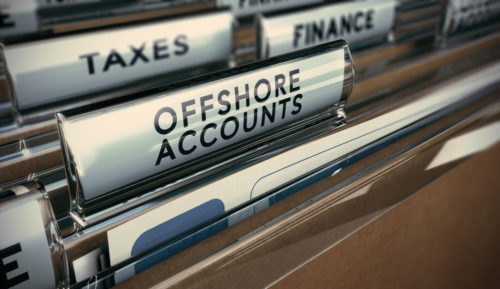An offshore bank account is internationally regulated and facilitates investments, simple day-to-day transactions of businesses, and retail banking. Offshore bank accounts have several benefits including higher interest rates, greater diversification, and deposit insurance fund insolvency. Offshore bank account holders often have more options and some VIP banking benefits that they otherwise would not have. Additionally, negative stigmas associated with offshore bank accounts is becoming more a part of the past.
Table of Contents
What Is an Offshore Bank Account?
Lowered tax liability, money laundering, and organized crime are reasons offshore bank accounts have suffered in reputation. There is a stigma that only the business entities should open offshore accounts. Although offshore bank accounts may have been seen negatively in the past, they are, nevertheless, a legal and viable option for protecting and growing assets.
U.S. banks are commonly not considered as secure as offshore banks, and in 2018 there were a combined 3,033 robberies (violations) in the U.S. Of these violations, most banks had a security system and cameras. However, not all banks used all security options available, such as guards, electronic tracking, or bait money. Most violations happened at a counter in the branch with a note and a threat of a weapon.
Increased regulation has helped those with a skeptical point of view see that offshore accounts are not only more secure, but that they also are not actually associated with money laundering, tax evasion, and schemes. The International Money Fund is a part of the regulations that have helped reduce the negative stigma of offshore banking. There are more cooperative connections nationwide for suspected criminal activity, and regulation requires banks to report quarterly. With heavier regulations, offshore bank account options have gained a more positive outlook, especially since the United States fell out of the top 20 list of countries with the cleanest banking.
Types of Offshore Bank Accounts
There are different offshore bank account types: commercial, private and retail accounts. Each has specific uses, benefits, and typical users.
- Offshore Commercial Bank Account – This account is for active, financially stable businesses that intend to function for the foreseeable future. There are typically several transactions that account for payroll, making payments to suppliers, buying, and selling goods. Commercial bank accounts are more difficult to open because they are less attractive to banks — this is due to the burdensome compliance and regulations associated with them. This creates more expenses on the bank end to funding payroll for specific employees who manage the accounts.
- Offshore Private Bank Account – These accounts are for individuals with a high net worth. Private bank accounts have an advisor that assist with investments for asset management and protection.
- Offshore Retail Account – Popular and used for personal banking with a low deposit and few transactions are retail accounts. This is an entry-level route for getting into offshore banking and you can open them with individual names, trusts, foundations, and LLC’s for simplicity.
Are Offshore Bank Accounts Legal?
Many individuals want a way of investing money but fear getting in trouble with the IRS. Contrary to that old belief, offshore accounts are a legal and feasible option for investors, businesses, and individuals, despite the fact that there will always be people who try to cheat the system and profit illegally.
The Foreign Account Tax Compliance Act (FATCA) requires banks to report balances and overall activity to the IRS. Although offshore banking is not illegal, it also is not tax-exempt. What this means is certain tax filers who own at least $50,000 in foreign financial assets must report this to the Internal Revenue Service. If someone who is required to report their assets does not, there are substantial penalties imposed up to $60,000 and more if the estimated value of assets is not accurate.
Why Do People Use Offshore Accounts?
Like any investment, some risks and rewards are essential to consider before opening an overseas bank account. Your personal goals, financial position, and timeline are considerations that you must make before jumping in. Aside from your situation, there is much research involved in where you will have your accounts held should you move forward with offshore banking.
Pros
- Convenience – Account holders can access finances any time. No matter where you are in the world, you have access to an international account. Some estates can use them to avoid hefty inheritance taxes (you need to seek legal advice); however this is another tax-advantageous avenue to pursue if the situation suits.
- Special Products and Services – Some offshore banks have VIP services for account holders. Less government intervention allows a bank to offer non-traditional services to account holders based on the framework of regulations and the specialization in alternative investments.
- Variety of Currency – A multi-currency account allows you to make deposits and withdraws in a range of foreign currencies. This offers the ability to get a USD-denominated checkbook to pay your bills within the United States and obtain loans in a variety of currencies. You can take advantage of emerging global markets and build or broaden an investment portfolio. Moving money between currencies through an offshore account can often minimize money lost through conversion fees.
- Higher Interest – Although you should not opt for an offshore account for interest rates alone, the interest rates in overseas accounts are often higher than U.S interest rates.
Cons
- Financial Security – Although a lot has changed, every system has flaws. Occasionally offshore accounts can be less secure. The Recession and following bank crisis in 2008 in the United States was a part of a domino effect from the Icelandic financial crisis. Several banks were acquired or filed for bankruptcy in the great recession.
- Accessibility – If you do not live or plan to visit the country where your bank is that holds your money, distance may make things difficult for you if you have a problem and need to speak to someone in person. If there is some catastrophe in a country, this could lead to additional challenges such as communication issues online or limited access to funds.
- Practicality – For those who do not enjoy paperwork hassles, this may be a big drawback. Each entity will have its requirements for opening up an account determined by its governing country. It may be as simple as a home address and another form of identification on the other hand, other institutions may require more documentation. You may have to keep a required minimum of funds to have the account. If you need a transfer, there may be more documentation to file.
- Connotations Associated – Regardless of the common misunderstanding, people may still associate offshore accounts with illegal, shady behavior and Ponzi schemes. Nevertheless, offshore banking is completely legal.
While offshore bank accounts may not be for everyone, they offer unique benefits that domestic banks simply don’t. Whether an offshore account is right for you will require research and an assessment of your personal needs.
Image Source: https://depositphotos.com/





